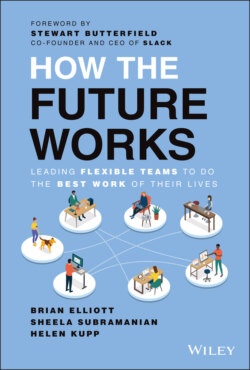Читать книгу How the Future Works - Brian Elliott - Страница 9
What Is Future Forum, Anyway?
ОглавлениеFuture Forum was born because we saw this huge opportunity to redesign work—something that hasn't happened since the Industrial era. We want to help leaders understand that opportunity—which is about far more than just designating some work-from-home days—and all it can do for their businesses.
Future Forum grew out of the fact that Slack has always had a strong research team dedicated to understanding how people work and what can help them perform even better, because the answers to those questions are fundamental to the products the company makes. It has been clear from that research that many workplace practices, structures, and measurements of success haven't kept pace with the massive change we have seen in the last decades in the kind of work people do in the knowledge economy, and how they get it done. Though much of the research once focused on making Slack products work better, there had long been rumblings, led by Butterfield, about starting a “Center for the Future of Work” in order to look more broadly at how “work” as an idea was changing—and more importantly, how it needed to change even further.
But the idea never really took hold, that is until 2020 when so much of the world shut down, businesses had to close their doors, and Slack, like practically everyone else, was forced to do things differently. We suddenly found ourselves in conversations with companies around the globe about how to continue to work under massive new constraints. In the beginning, the nature of those discussions were highly practical: How are you handling this? Are your people able to work like this? What's getting in their way? How are you supporting them? What's working? What are you saying to Wall Street about what's happening?
After a few months, however, things began to settle and executives moved from a crisis mentality to a more philosophical one. We started having conversations with leaders in all kinds of business, and not just tech companies, about how surprisingly well certain things were going, how productivity seemed to be holding steady, if not improving, and how certain people even seemed to be happier and more engaged than ever before, while others were struggling under tremendous challenges. Admittedly, it came as a surprise to many leaders that just because people were largely on their own, working outside the office and, to a great extent, on their own schedules and terms, didn't make them worse employees. With this new realization, gradually the conversations moved from “How do we make this work?” to something else: “Does this work so well that we should be rethinking the way we work, not just for now, but for the long term?”
Out of that context, Future Forum was born, a consortium focused on redesigning work for all types of people. We guide executives to build workplaces that are flexible, inclusive, connected, and ultimately more effective for the world we're living in today. We conduct original research and engage thousands of executives from a wide variety of industries in order to learn from one another, experiment with new concepts, and ultimately push our thinking about what the future can hold.
The upsides of flexible work have been a welcome surprise, of course, but it hasn't all been a rosy picture—and our research has looked at that, too. It quickly became clear that we have created an inequitable system where benefits are not distributed evenly across the board. There was massive unemployment in some sectors, for example, especially where it wasn't possible to shift to different ways of working. And for those working from home, caregiving responsibilities paired with school closures often made work more difficult, if not impossible. These inequities have disproportionately affected women, especially women of color, but flexible work has provided an upside for many historically disadvantaged groups as well. Women and people of color are among the groups who say they want flexibility the most, for reasons we will discuss in later chapters. In fact, now that so many have experienced what flexible work can do for them, the vast majority of knowledge workers say they want more of it. Our research shows that flexibility is the most important driver of job satisfaction behind compensation.
One of the core goals of Future Forum is to understand what people need, to do their best work, and find ways that leaders can meet them where they are so organizations and people can find greater success together.
“To me, flexible work is the future. If there's one silver lining of the pandemic, it's that this time away from the office has allowed us all to reevaluate our priorities.”
— Ben Chestnut, co-founder and CEO, Mailchimp9
